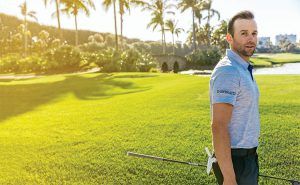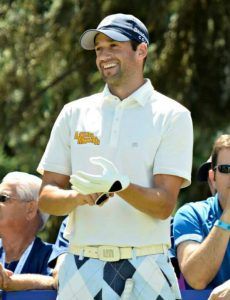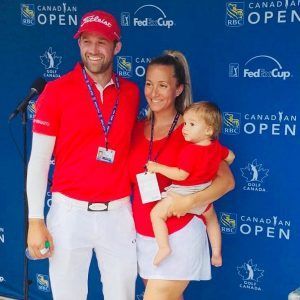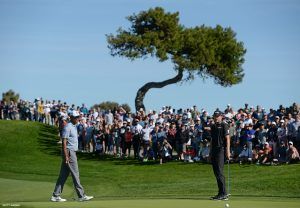PGA Golfer Ben Silverman – Underdog Breaking Through
PGA Golfer Ben Silverman – Underdog Breaking Through

Why do the incredible feel-good stories of underdogs bring a certain warmth to our hearts? The undeniable perseverance beyond all odds and a heart that knows purpose keeps us wondering about the underlining factors that build such phenomenal players. Athlete Ben Silverman brings light to his ability to stay true to his path of golfing and tells us what it takes to break through. His humble roots, undeniable mental strength and physical health strategies make Ben a very relatable underdog-makes-it story. In an interview, Dr. Eric Plasker asks PGA golfer Ben Silverman what it takes to break through in the world of PGA Golf and what he learned from playing with Tiger Woods.
The Winning Edge
Dr. Plasker inquires, “So for you personally, what do you feel like is needed from you mentally, physically, to get to a the highest level?”
Ben: Before playing with Tiger, I had been having this goal of like all right, I’m in there. I’m trying to win the tournament; but at the same time in my subconscious I’m thinking that a bunch of 30th place finishes will add up and get me points to do good for the year. I’ve realized that’s not the “winning way to think.” So I’ve just completely shifted my attitude moving forward to winning is the only thing that matters. I’m going to expect to be in contention when I play. I am going to expect to hit all shots the way I want. I’m just going to take that same approach that I’ve learned and sensed from playing with Tiger and go with that because that’s going put me in places where I want to be rather than just trying to do well.
Dr. Plasker: “Very cool. Because you have a beautiful family and the balance, how do you see yourself being able to balance that winning attitude energy while also being able to separate yourself from that competitive fire to be the dad, husband and family guy that you also truly want to be that’s world-class number one?”

Intentions, Attitude, and Drive
Ben: “I mean for me the family guy, the husband I want to be, I don’t feel like I need to work to do that. That’s just me. That’s just the way I am. I always think of family first and make sure I’m taking care of things for the family first. So to me, that doesn’t feel like work. And the only difference I think for the golf is I mean I put in … I put in a lot of time. I don’t think I need to change the number of hours I put into golf. Maybe I need to focus a little bit differently, focus in on honing my skills a little bit more rather than just going and playing practice rounds and going around the golf courses to learn the courses. Pretty much I know them now. I have already played them once.”
“Less energy is going to be put on honing my skills a little bit better and everything I do now is going to be with that attitude of just trying to win. I think that alone is going to change my perspective in the way I practice and the way I do everything on the golf course.”
Mental Difference
Dr. Plasker: “And is it aiming for the bullseye more or not being afraid to hit a bad shot? And what’s that mental difference?”
Ben: “What I’ve learned is that if you’re trying to win and winning is the only thing you’re trying to do then you’re expecting to hit a good shot every time because you need to win. So it’s like this one track mindset. I don’t think doubt has a chance to creep in when you’re thinking that way because you know you’re going to hit a good shot because you’re trying to win a golf tournament. And as long as you’re thinking that way, there is never going to be a chance for doubt to creep in.”
Resiliency in Challenges
Dr. Plasker: “I totally hear what you’re saying and I believe that what you’re saying is true. So what happens when you do hit a bad shot? How do you, in your mind, stay on track with what your intention is and what your goal is?”
Ben: “I almost think of it as an extra motivator. If you hit a bad shot then it’s like you let a little bit of anger out because it’s not anything close to what you were trying to do but then now it’s an extra challenge to hit an even better shot next time to get yourself out of trouble and to get back on track to winning.”
Dr. Plasker: “Do you say something to yourself? Do you talk to yourself? Do you have certain words that get you there or do you just trust that it’s in you now?”
Ben: “I mean I’ve always kind of been that way with bad shots. I’ve never let them get me down. I’ve always been able to recover quickly. I don’t have affirmations for them. It’s just a resilient, bounce back attitude that I have when I’m playing. So I never get down about that kind of stuff. Again, it’s extra motivation- like, now I’m really going to get this one good because I’ve got to get it back because I’ve got to win. It’s a little extra edge.”
Chiropractic on the Green

Ben: “For me, that’s easy because I’m getting adjusted on a regular basis. I have no doubt my body is going to hold up and do what I need it to do. It always like, even if I’m feeling run down energy-wise one day or you know, I might be tired, I know my body is still going to be there for me because I take care of it, exercise on a regular basis, and I get chiropractic adjustments on a more regular basis than probably anybody else. So I know my body is going to be there for me. I never have to worry about it.”
Dr. Plasker: “That’s great. When did you start utilizing chiropractic care?”
Ben: “I‘ve been using chiropractic care my whole life. There was a little period in the middle where I stopped getting adjusted. My parents were going all the time. We’d go on a regular basis maybe like once a week, once every couple of week for Lifestyle Care, and it helped us stay healthy. We never had any major health issues. And that was right up through high school.”
Didn’t Understand Importance
“Then I went to college and with being Canadian, health insurance didn’t quite transfer over the same way so I didn’t have the same coverage to go to the chiropractor when I was in school. And I went here and there just to try to keep it up but I didn’t understand the importance of it enough to make the effort to pay for it and keep going. So I just ended up stopping for maybe a seven-year period.”
“And that’s a long time. Especially like in my young 20s when I’m traveling and just started playing professional and I started to notice from my repetitive moves with golf I started getting some back pain that was constantly around. When I met my wife Morgan the right side of my body, my low back, my neck were just always nagging at me.”
“And that’s way too early to be having those kinds of issues for a professional athlete. I’m thinking like that’s going to shorten my career like crazy. So I started to think I need a chiropractor. I need to get back into going to see one and then I happened to meet Morgan at the airport and it was just amazing how it worked out because she told me she was a chiropractor. I was so excited. No way. I’m actually … I need a chiropractor. And I had no clue that we were going to get married but I was thinking, I met this chiropractor. This is great. She’s in New York. My sister lives in New York. Now I can get adjusted by her when I go visit my sister. And that’s all I was thinking when we started talking.”
“When the Universe Throws You a Bone”

Dr. Plasker: “That’s great. And so I’m curious. What percentage of the people on tour would you say get utilize chiropractors?”
Ben: “It’s hard to say because all the top guys I know are going– It would be kind of a rough ballpark number. I just know there’s a trailer that travels with the tour that we can go to that is paid for by the tour and we can go in there whenever we want and get taken care of. So I know a ton of guys go in the trailer all the time.”
“But then I know that there’s a bunch of private docs that travel for five or ten players and all the top players go see those guys. And there’s another doc that I know who is a really good chiropractor and he’s got like ten players and they’re all in the top 40 players on the PGA tour. He’s got big names, McElroy and Jason Day that he takes care of. So I know those guys are getting adjusted and getting their bodies looked after and I’m assuming a bunch of the other guys are too.”
“Every time I go in the locker room I see guys working with these private doctors. I see guys in the trailer.”
Dr. Plasker: “And … Morgan takes care of you?”
Ben: “Yes. She does because she travels full time with me. So if she’s not around then she looks up somebody that she knows in the area, somebody through her connections on Facebook that we know is a good principled chiropractor. I usually go see them. It’s very rarely now do I ever go a week without getting adjusted.”
Dr. Plasker: “That’s great. It’s nice to be able to trust your body at every turn.”
Ben: “Yeah. Exactly.”
Lifestyle Care as a Family

Ben: “I mean that’s a whole different lifestyle on its own. I feel like we live in this tiny bubble in the minority of the rest of the world that believes in the body being able to heal itself, being able to live naturally without western medicine and I mean it’s a completely different part of the world to live in that nobody really appreciates or considers because they just go straight to what the media says. Go to your doctor. Go to your hospital if something is wrong and we know different. We know a better because we know more about how the body truly works and its power. So it’s interesting. It’s like if you don’t hang out with people in that realm it’s difficult for others to understand how awesome that lifestyle is. You know that.”
Dr. Plasker: “Yes I do. And this is a major reason why we wanted to share your story. One of my favorite lines in the 100 Year Lifestyle, it goes like this. It says your body’s innate intelligence will organize around the thoughts that you think, the choices that you make and the lifestyle that you live. And everything that you have said about how you think about things, it’s almost like you understand that you can program your body to be a certain way, to function a certain way, through your thoughts, your actions, your beliefs. Any comment about that?”
Programming Our Bodies
Ben: “I believe that a hundred percent we can program our bodies to do what we want through our brains, especially after I dove into some of Dr. Joe Dispenza’s teachings with his books and just from the little I’ve read and a couple of his meditations I’ve listened to, and real-life examples that he’s put out, it’s clear that we can control our body with our brain with enough practice. So I believe when I tell you the mental attitude stuff on the course, I believe if that’s the way I’m truly thinking my body is just going to follow suit. There is no if, and’s or buts. That’s just the way it’s going to be.”
”And I love golf! I want to be able to compete for a long time and enjoy the game my whole life that’s why the 100 Year Lifestyle principles are meaningful to me.”
Dr. Plasker: “Love that.”
Ben: “So yeah, that’s all stuff that me and Morgan live by, which I probably wouldn’t have if I didn’t met her. So I’m glad that I did because it completely changed my life.”
An Underdog in the World of Golf

Ben continues, “But I was actually going to say one last thing to throw in if you want. People always love an underdog story.”
Dr. Plasker: “Yes they do.”
Ben: “So the fact that in a golf environment, which is usually, no offense, a rich white people’s world. I didn’t grow up in that world and my family didn’t come from that world. We were hard-working, middle class, I didn’t even know what golf was, really. We didn’t have connections to any country clubs. And I just decided I wanted to play golf and work hard at it and had to get a lot of help along the way, free coaching from people who were willing to help me out. Somebody who put in a good word for me to be like an endorsed junior member to join a private country club where somebody had to look out for me and I never got scholarships in college. All four years I had to try out for the team every single year.”
Dr. Plasker: “Wow. That’s perseverance!”
Ben: “My parents were paying full pop. Like $20,000 a year in tuition plus living and all that, all four years. So I got a few academic scholarships here and there but there wasn’t a lot available as a Canadian in the US. There’s not a ton of academic scholarships available. So it was the hardworking, grinding way to make it with help from people along the way but no handouts. I had to work hard for everywhere I’ve gotten because I didn’t grow up in the golf world. I didn’t know anybody.”
Winner’s Circle
Dr. Plasker: “At what point in your journey do you look into the winner’s circle, see somebody lifting a trophy that you want and you say: “You know what? I belong here.””
Ben: “Well, I think I’ve been fighting that subconsciously my entire career that I belong here, because I never grew up in that world. I was never part of it. All the guys that were All Americans in college or had played these big junior tournaments, they kind of all know each other. They’ve all seen tons of success at those levels and so they expect that success as they make the climb. And even though I’ve had success at each level, I’ve constantly had to battle that thought of do I belong here or, you know, do I fit in with these guys who have accomplished all this stuff and it’s never conscious thoughts.”
Lessons from Tiger
Ben: “They’re all just subconscious little annoyances that creep in and kind of get in the way of the right mentality, which is why I’m so excited about what I learned from playing with Tiger because I think it just completely resets my mind so none of that other stuff matters and winning is the only thing that matters. It doesn’t matter who you are when you have that mentality or who you’re competing against because it’s you against the golf course and whoever else is playing well that day. And you’re expecting to win because all you care about is winning. I’ve played one round since that round with Tiger and in that mindset, you don’t even look at who you’re competing against or who’s playing. You don’t look at anything other than what’s the top score and you’re just chasing after that.”
Dr. Plasker: “So Ben, what was that like playing with Tiger for the first time? You said you needed that experience?”
Ben: “Yeah. I needed to go through that experience. Well, for one, the crowds were totally different than any crowd I’ve ever played in front of before. And I mean it’s just hordes of people following me around. There’s extra security just like six cops following our group to make sure things are under control, escorting you to the bathroom and stuff like that.”
He continues, “It’s just all different. And then he’s got this like aura, this energy around him that you can feel he gives off, like he’s the best or he knows he’s the best, even if he’s not playing well. It’s like little comments he says or just like the way he approaches holes, you can … you get that sense from him. It is just cool to be around. It’s like a total dominant type of mental attitude.

“So I feel like it’s freedom in a way, switching to that mindset.”
Dr. Plasker: “Yeah. And now he knows your name and he’ll wonder if he belongs playing with you, haha.”
Ben: Exactly. “Well, I don’t think he ever will because that’s not his mindset. He’s arguably the greatest golfer of all time. He’s never going to be in that mindset. But, I know the closer I can get to that mindset the better off I’ll be.”
Dr. Plasker: “That’s great. Well, I’m excited for you man. You sound great. I’m happy for you. Thanks for sharing.”
- SHARE THIS POST


